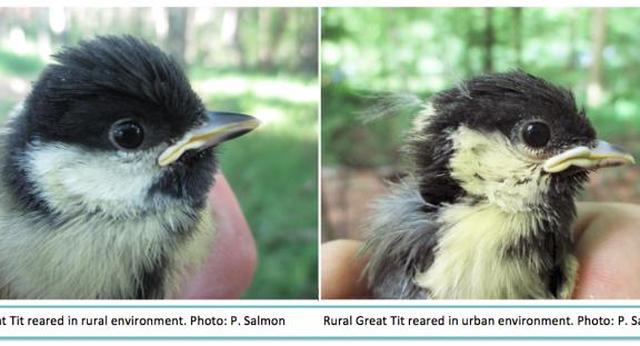Hard to believe, but these two birds pictured above are the same age. The only difference is that the one on the right grew up in an urban environment. It’s an observation that’s raising questions about the health of birds and other urban animals — including humans.
Researchers from Lund University in Sweden have shown that birds of the species Parus major, commonly known as the nesting great tit, are at an increased risk of dying young when they’re reared in an urban environment. Biologist Pablo Salmón and team demonstrated that early exposure to an urban environment can disrupt the normal development of birds — with potentially irreversible effects on life expectancy.
“Although there are advantages to living in cities, such as the access to food, they seem to be outweighed by the disadvantages, such as stress — at least in terms of how quickly the cells of the great tits age,” said Salmón in a press statement. By stress, he’s referring to such things as noise and light pollution, and close proximity to humans (not to mention cats).
Salmón’s team discovered that the lengths of telomeres in urban great tits are shorter than those found in their country counterparts. Telomeres are located at the tips of each DNA strand in the body’s chromosomes, and they’re best described as a kind of age biomarker. Short telomeres imply short life expectancy, both in humans and great tits. This new study shows that the environment in which a bird is reared in can determine the length of their telomeres in a profound way.
The researchers studied a group of closely related great tits. Half of them grew up in the city of Malmö, Sweden, while the other half grew up in the country. After just two weeks, the difference in telomere lengths between between the two groups was already pronounced. Normally, genetics determines telomere length, but this study shows — for the first time ever — that growing up in a stressful environment can have an even greater impact.
“The impact that urbanisation has on wildlife must be studied much more, or we won’t be able to understand the threats that birds are exposed to in urban environments, and won’t be able to do anything about them,” said Salmón. “Our results also raise questions concerning the ageing of other animals affected by urbanisation, and humans for that matter.”
This study highlights the need for further research to assess the impacts of urban stress on other populations. It would be interesting to know if telomere lengths in humans are constrained by similar factors, for example.
However, bear in mind that only one species of bird was studied. Other birds, such as pigeons, robins and blackbirds, seem to do well in city environments, as do animals like raccoons. The issue, it would seem, pertains to animals who are suffering from habitat loss, and who don’t fare well in cities.
